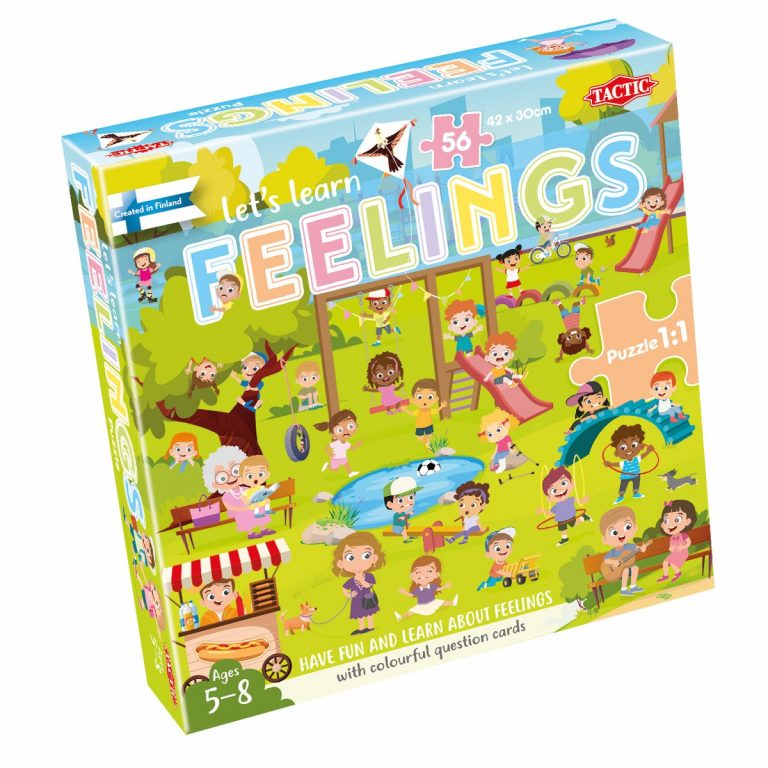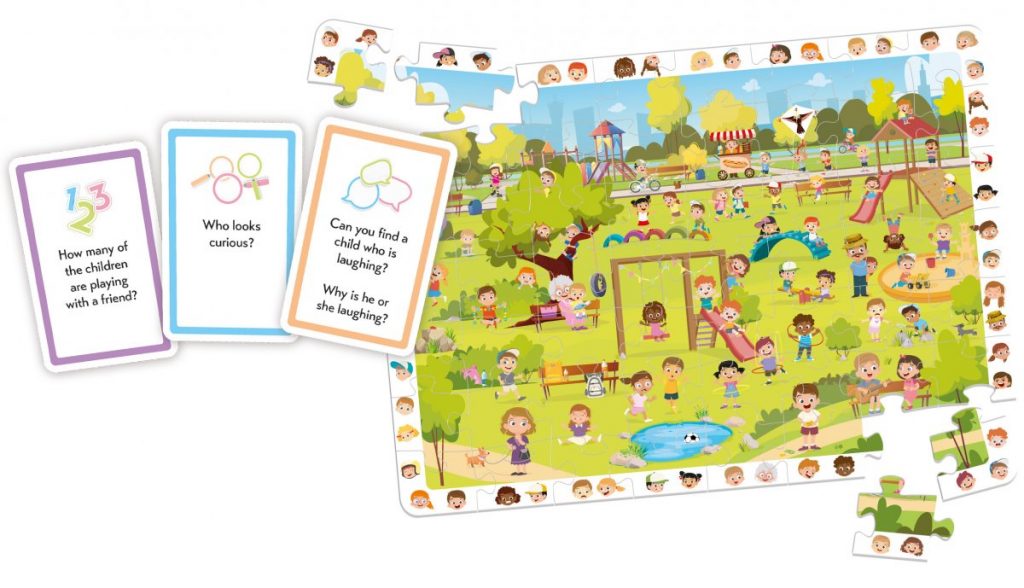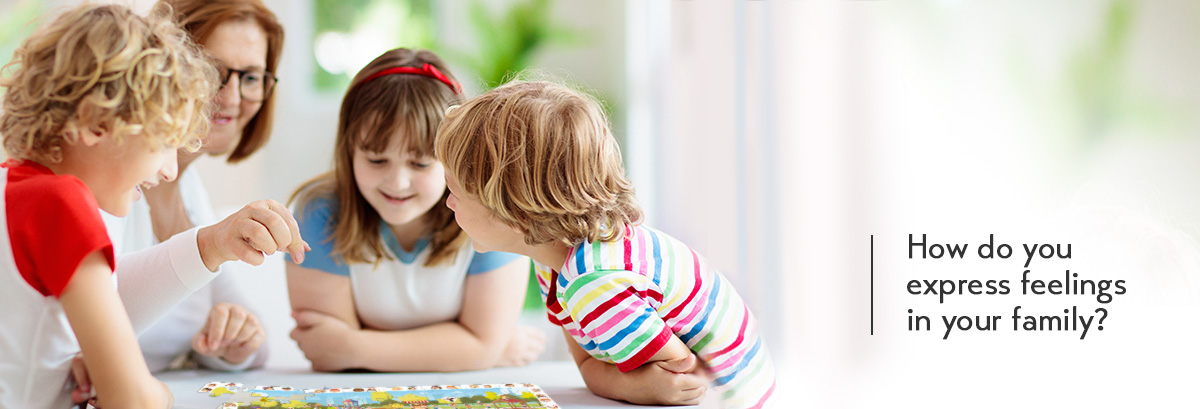
How and why is it worthwhile to grow your child's emotional skills?
A child experiences many kinds of feelings during the day but they don’t yet have the words to talk about them. That’s why feelings are seen and heard. It’s good to teach your child that feelings are allowed, that they are a part of life and that they can show, but that it is also good to control them.
Let’s name our feelings
A child learns words that describe feelings in everyday interactions. Even if your child is very young, you can put their feelings into words by saying “Are you excited?”, or, “I think you feel happy after meeting Grandad.” The child notices that a grown-up understands their internal feelings, which in turns helps them to feel calm. The child learns to describe their own emotional state.
Practice describing your feelings with the help of books and games. Recognise feelings from expressions, perform different feelings yourselves, and discuss the reasons and consequences of different feelings.
Guide your child to recognise feelings
Discuss the feelings a character in a book might have: “How did this character feel? Why does he have that kind of an expression?”
Guide the child to see which signs refer to a certain feeling, for example the expression and position of a character in a book.
Gradually, the child learns to recognise and name their own feelings and to understand that other children have feelings, too.
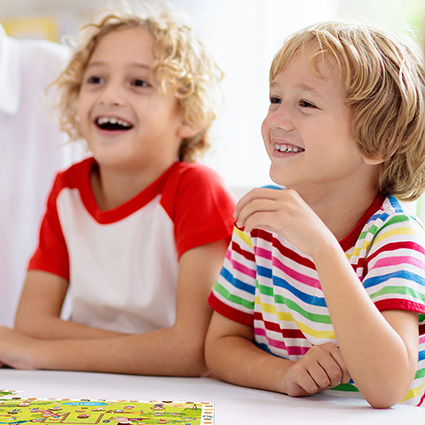
Photos: FamVeld / Shutterstock.com
Children learn by copying
Tell your child about your own moods. Explain, why you are annoyed by something, or why something made you happy today.
You should also think about what kind of an example you set your child – how do you express feelings in your family?
Talk it out after different situations
When the child does something that makes another person feel bad, tell the child how the other person feels.
Ask how the child would feel if someone did the same to them. By putting themselves in another person’s position, the child learns empathy.
Recognising and controlling one’s feelings helps the child get along with other children. It’s easier to make friends, and working in a group becomes smoother.
Let's learn Feelings puzzle
This 56-piece puzzle offers a grown-up and child an opportunity to examine different feelings together. Little by little, a child can learn to understand their own feelings and to put them into words.
- The high quality 56-piece puzzle is full of wonderful details to explore.
- Comes with a list of questions that can be used to talk about feelings.
- Helps children to understand where different feelings might come from.
Videos
Read out more about the Let’s Learn range here.
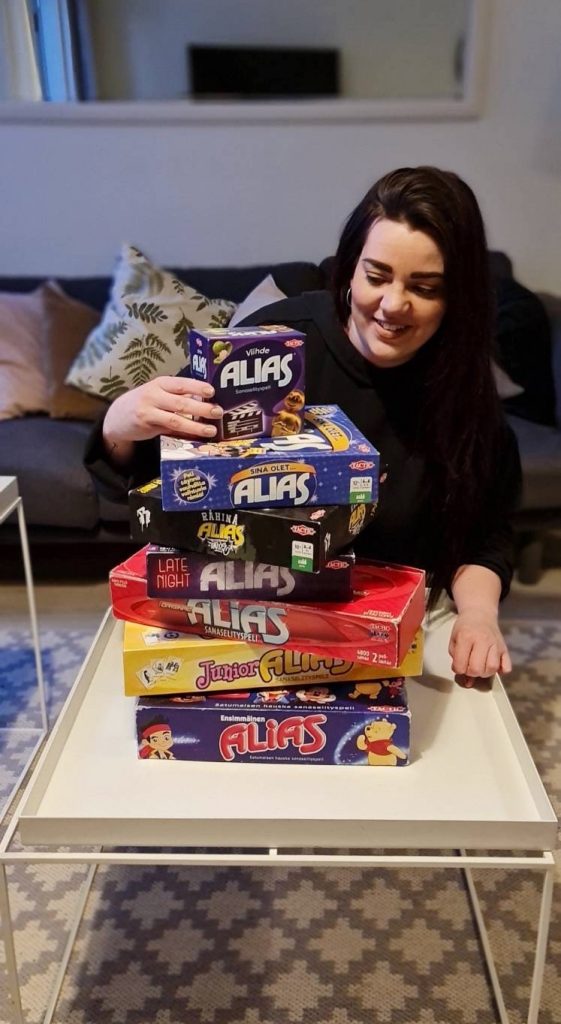
I’m always having more fun with Alias
Alias board game has millions of loyal fans around the world. We talked to one of them to find out how Alias keeps people entertained year after year.
Manna Fransas is in her thirties and lives in Helsinki, Finland. Coincidentally, she is about the same age as Alias, published in 1981. Manna works at an ad agency as a copywriter and her hobbies include basketball. Manna’s immediate family consists of her two children, her partner and his daughter.
Manna recalls that she was still in primary school when she first played Alias with friends from her neighborhood. From day one Manna was drawn to Alias because it was fun, inventive and fast paced. Even though Manna plays plenty of other board games too, Alias has always been her number one choice. Words like energetic, daring, social, happy and humorous describe Alias pretty well – and admittedly her own bubbly personality as well.
Get the party started
When Manna leaves for a cottage weekend or skiing with friends, Alias is always packed along. Just before the Covid pandemic hit, Manna celebrated her 30th birthday with a big group of friends in Barcelona. With her, she had the Late Night Alias – a perfect adult party highlight.
Alias fandom has also spread to Manna’s offspring, and she has played plenty of board games with her children. Now her children can also play Alias together. Manna sees that Alias has many educational benefits: children’s vocabulary extends through play and they also learn necessary social skills, like losing. Manna still prefers to play Alias with her own friends – they offer a much needed challenge to the veteran player.
Manna has bought her fair share of Alias games during the years; the most popular ones are on their second sets already. In addition to the Original Alias, Manna’s game cupboard holds Junior Alias, Disney’s first Alias, You Are… Alias, Party Alias, Late Night Alias, Rähinä Alias (a Finnish exclusive) and Snack Alias Lights, Camera, Action. She has an ideal Alias version for every occasion.
Mastering her game
Even though playing Alias is all about having fun, the will to win is genuine. Manna claims jokingly that she has never lost a single Alias game, but she admits that playing a lot helps. Especially with the Original Alias, the words are so familiar, that she always knows the quickest ways to explain them. That’s why Manna keeps buying new Alias versions, so she’ll have fresh words to explain.
All of Manna’s closest friends are pretty competitive, too. During Alias, emotions tend to heat up and sometimes an odd quarrel stirs up. Luckily, so far no friendships have been broken off because of Alias, and the winners are always happily rewarded with something like a bottle of bubbly.
There are also funny inside stories when friends play a lot together. For example one of Manna’s friend didn’t know the word mosaic, but instead explained the word mosque. This funny mistake still makes her friends laugh. So playing Alias can expand your vocabulary even as a grownup.
How to win Alias
In addition to verbal talent, Manna thinks that Alias also requires strategic skills. It is not the same how you explain the words, and whether you explain long words or praises in two parts or together. Here are Manna’s hot tips for winning Alias:
- Explain it simply, use as many opposites as you can: Not hot, but cold. Not long, but short. Also use plenty of synonyms.
- Explain compound words in two parts: “Milkman delivers bottles in the morning and is not a woman”.
- If you don’t know the word, don’t even try to explain it. Take a minus point and move on rather than get stuck on a difficult word.
- Know your team members, so you can benefit from common praises and history. Manna’s favorite Alias team member is her little brother.
Finnish entertainment package
As an adult, the Finnish roots of Alias have become more important to Manna. She thinks it’s great that Alias represents Finnish talent and knowhow. Manna also has a big pile of other Tactic’s games, which are all made in their own factory in Finland.
If Manna could design her own version of Alias, she would add a novel surprise element to the game. In the D.I.Y. Alias, you can already come up with your own words, but an unexpected surprise, like a team change in the middle of the game, would add suspense for even the most experienced player. But would a sure win still be guaranteed?
Manna has a firm opinion on why everyone should play Alias. It’s fun yet educating. It builds team spirit and cooperation skills. It’s easy to learn and anyone can play it. You can never get bored, because every player and play session is different. A perfect entertainment package, indeed.

